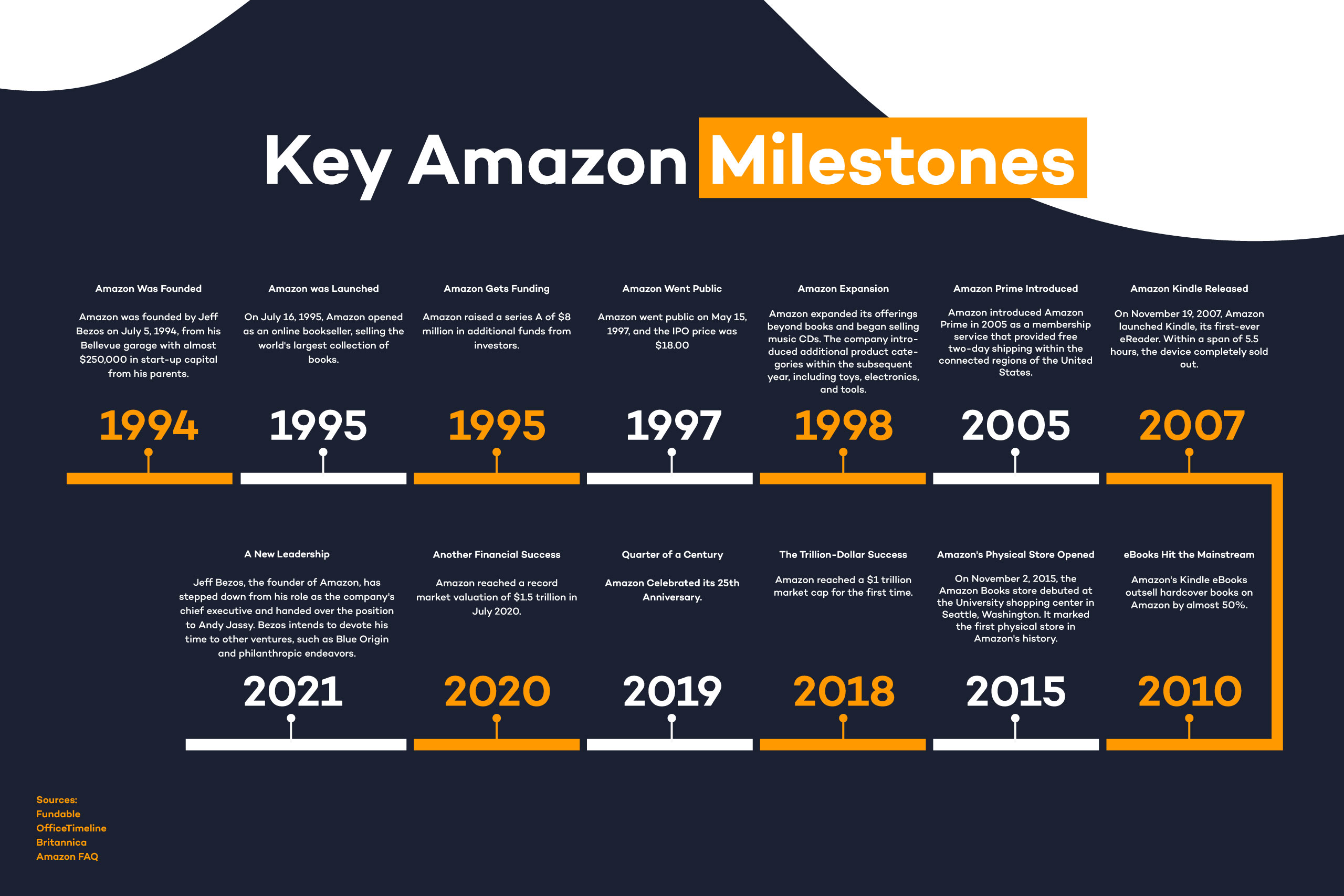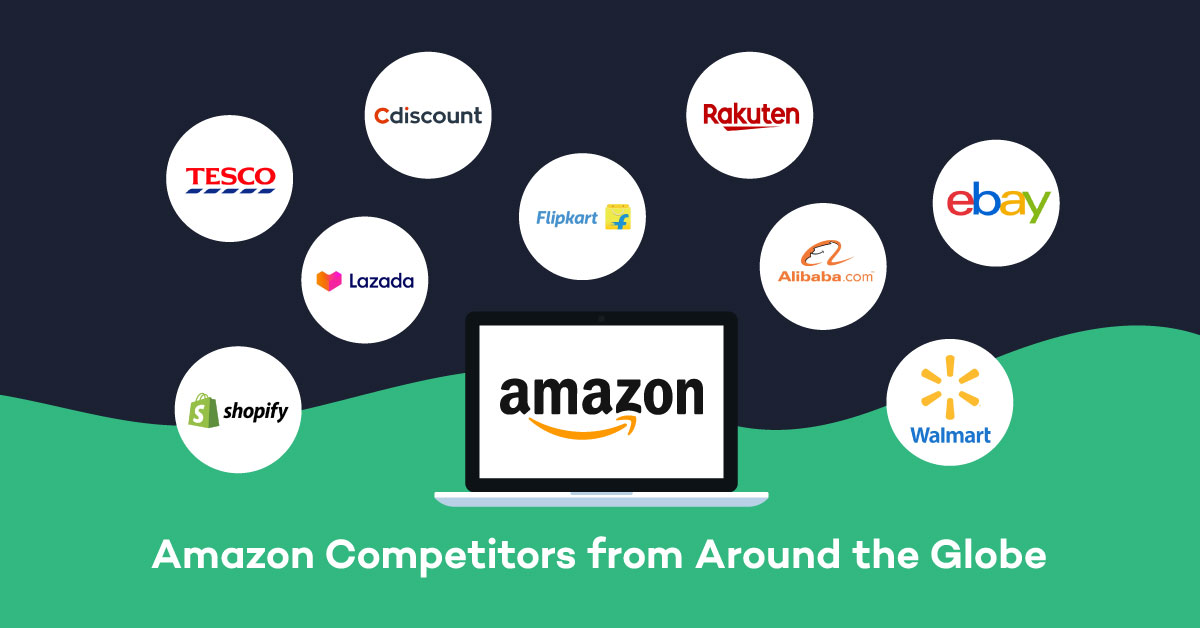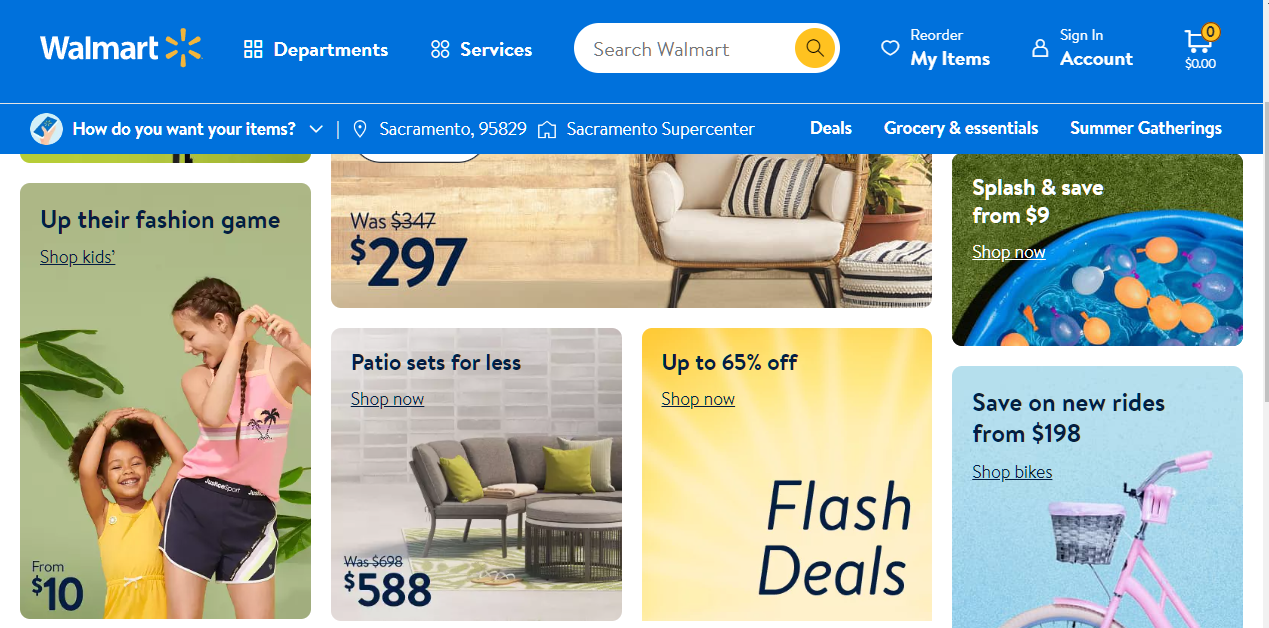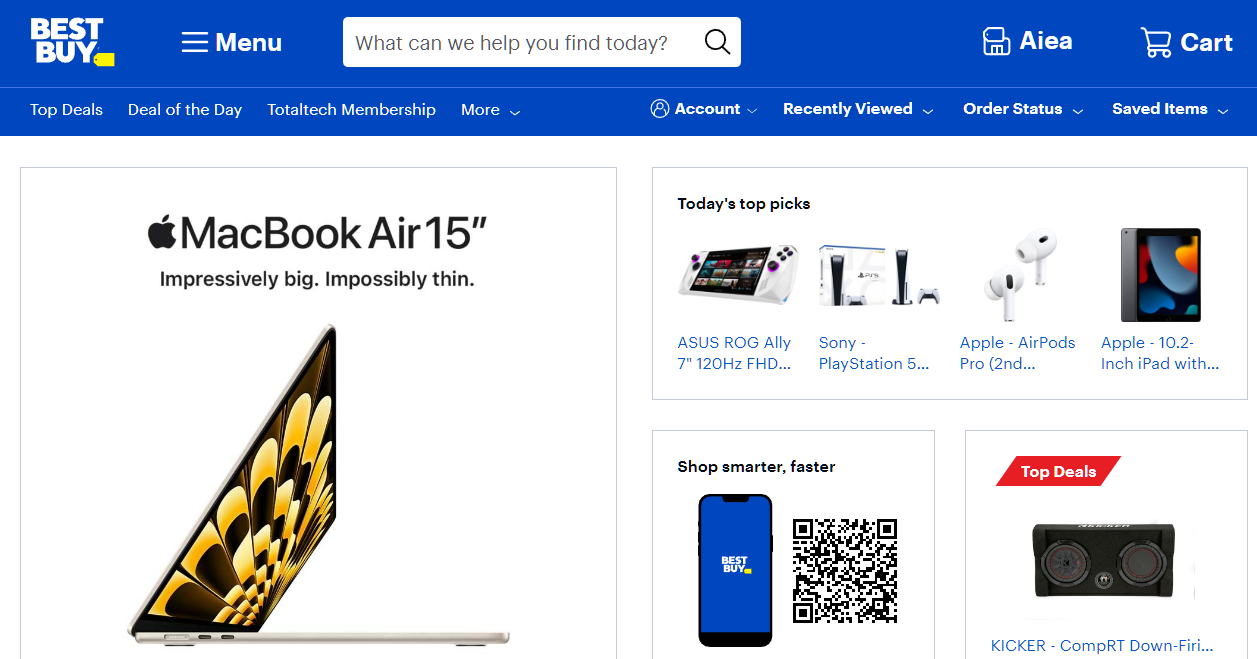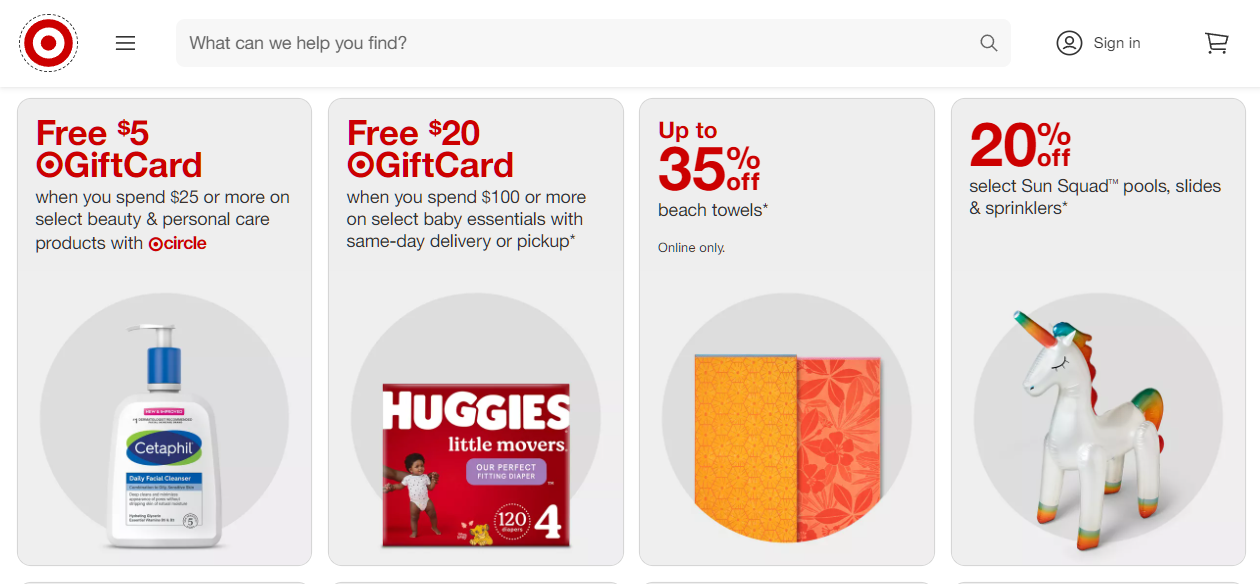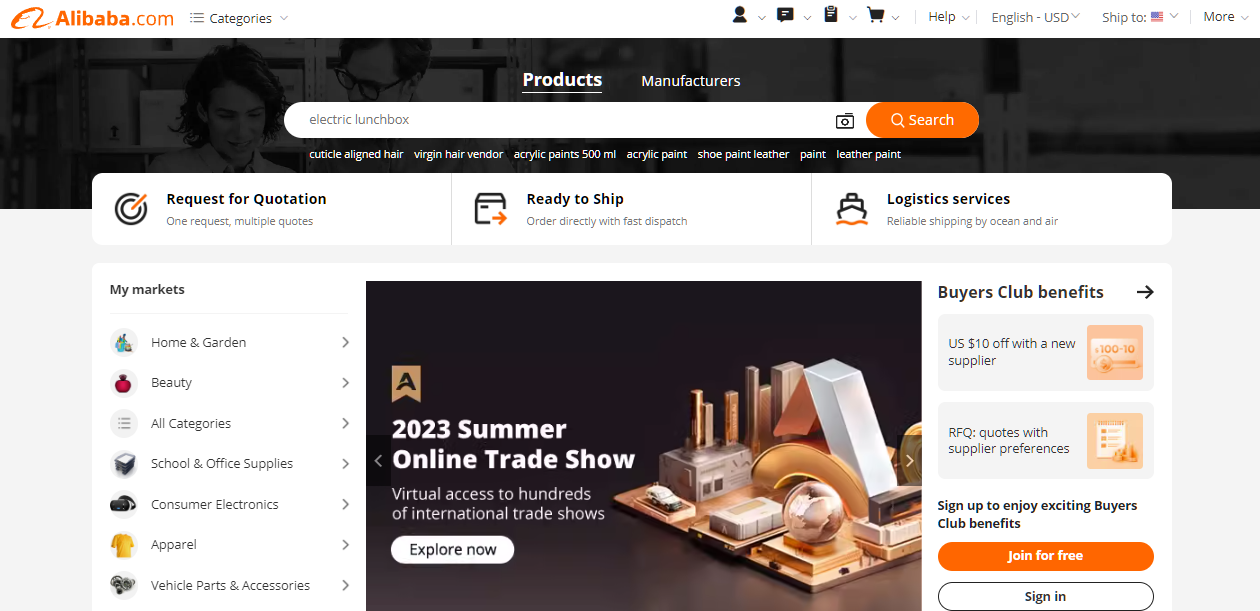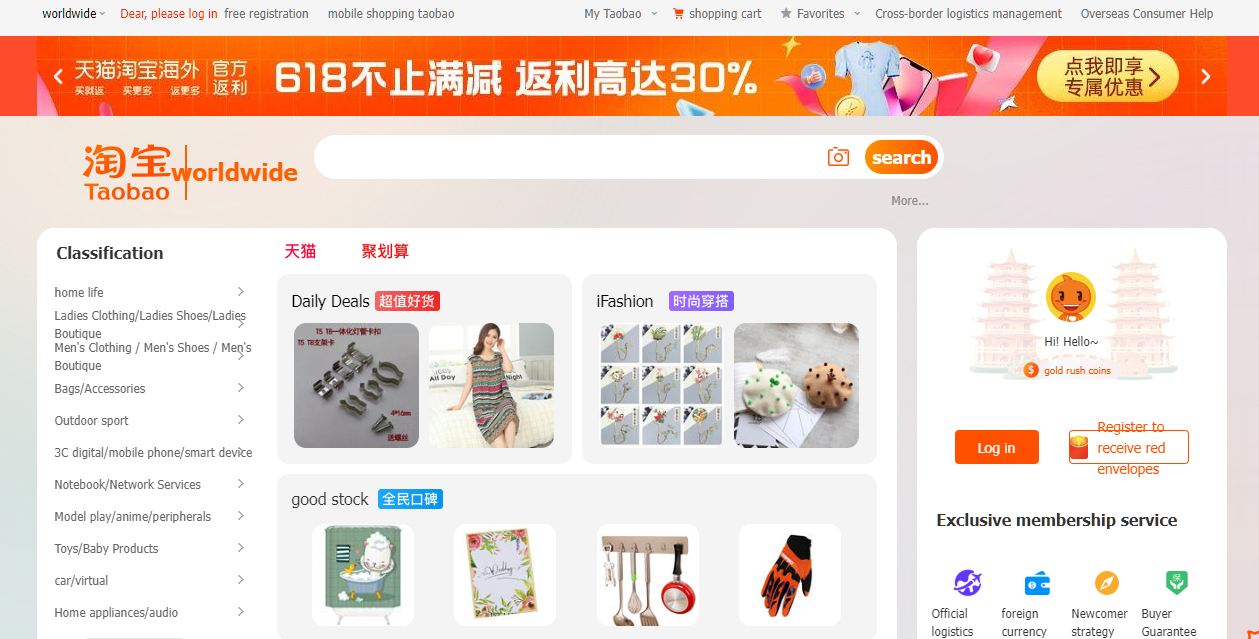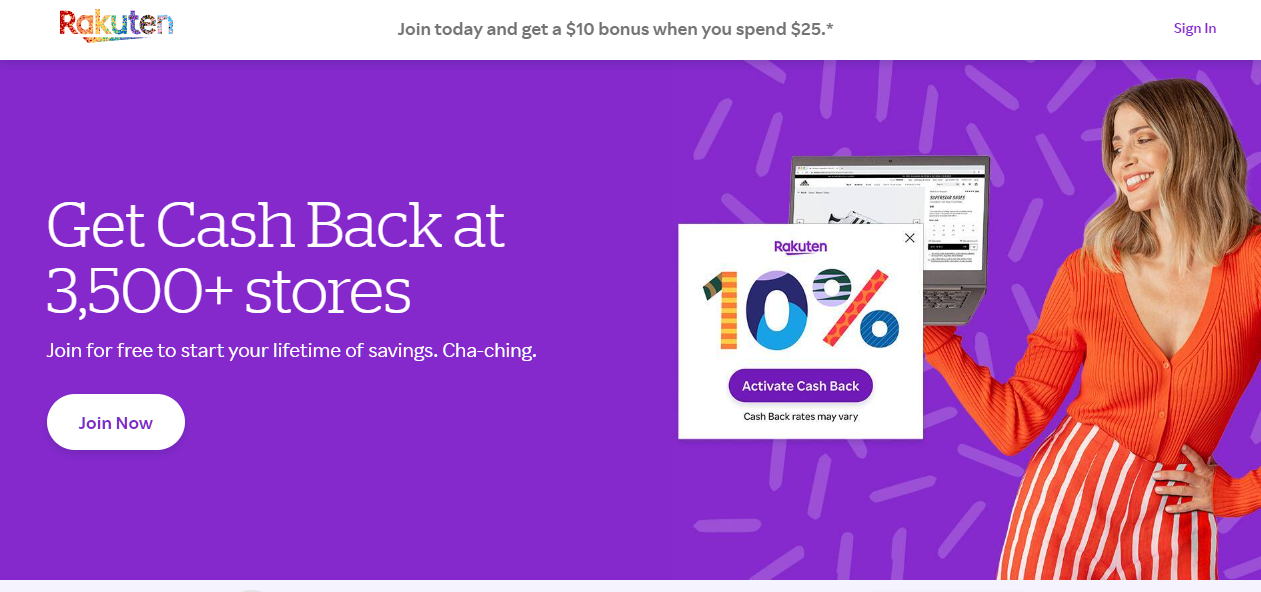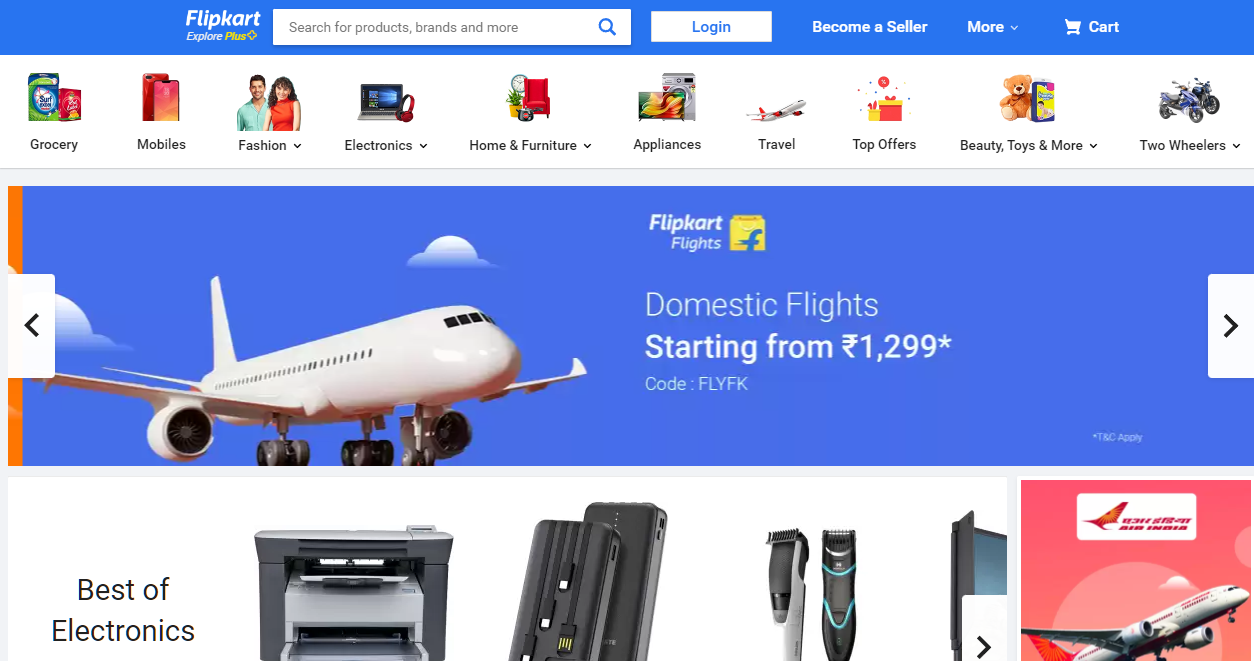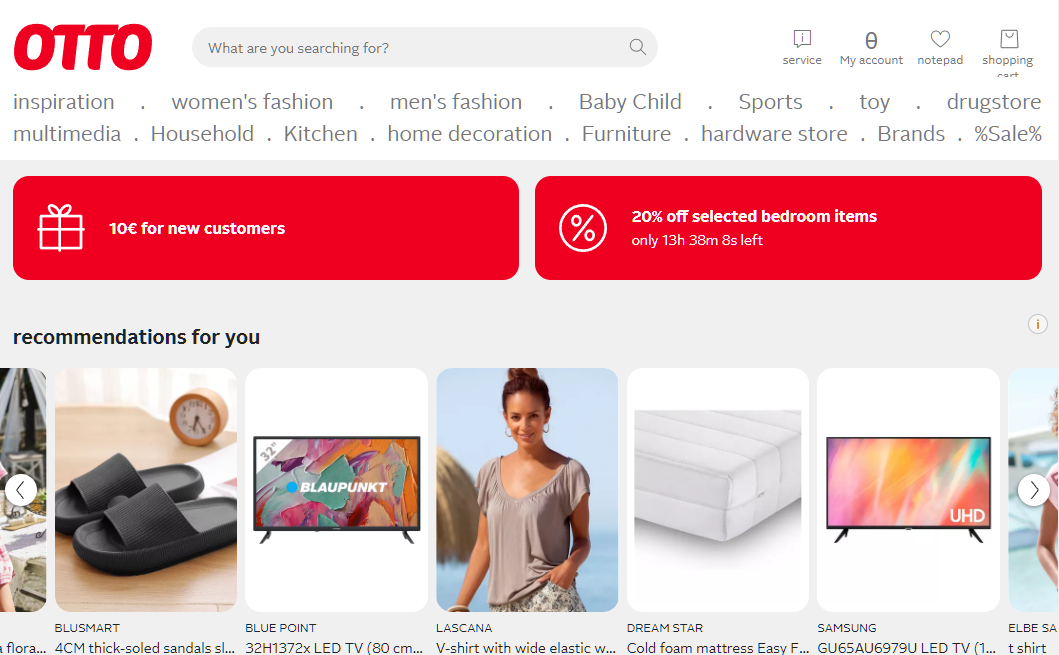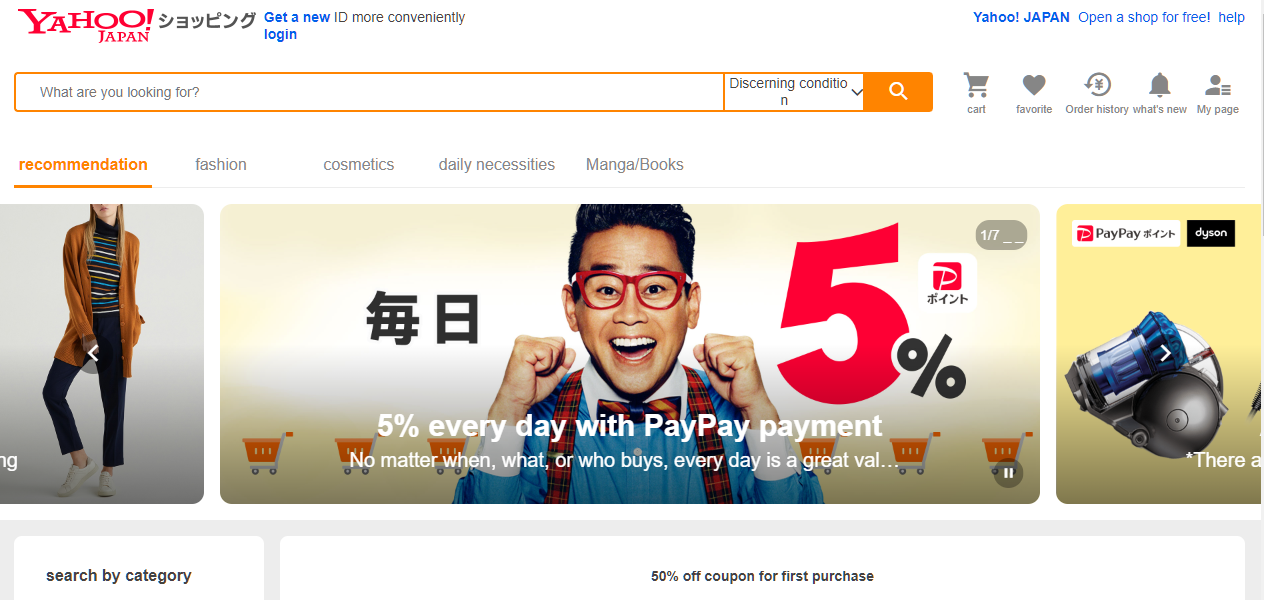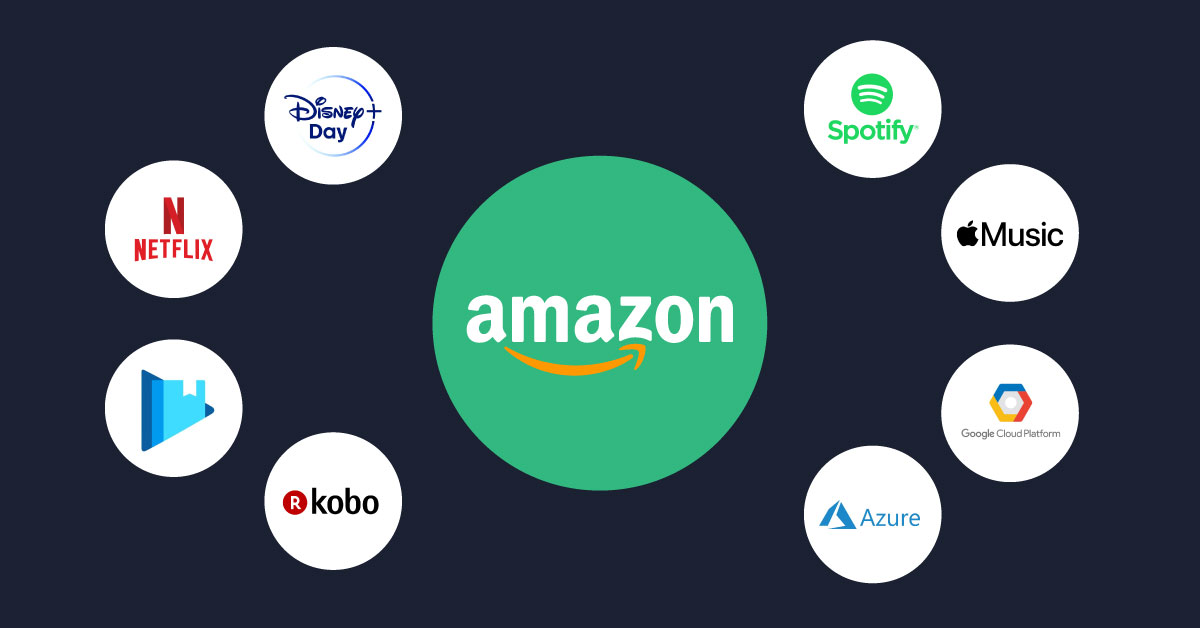Over the years, Amazon has evolved remarkably from a modest online bookstore to a highly diversified trillion-dollar enterprise. Currently, Amazon is one of the widely recognized brands in the eCommerce landscape, which is highly popular across the globe.
While expanding its business, Amazon inevitably encountered competitors from different sectors such as eCommerce, cloud computing, and digital streaming. In this article, we will explore some of the Amazon competitors that the tech-giant encounters across the industries in which it operates.
Overview of Amazon’s Success
When Amazon started in the mid-1990s as an online bookstore, many investors did not expect it to reach astronomical success. Even Warren Buffett, one of the world’s greatest investors, was not able to recognize the potential of Amazon beyond selling books.
During an interview, Buffett admitted that he had not realized the extent of Amazon’s potential. Buffet said he “didn’t realize you could go from books to what’s happened there.“
Amazon’s straightforward business model, user-friendly platform, and customer-centric philosophy and innovations have significantly contributed to its success. Within a span of two decades, Amazon emerged as the largest eCommerce company worldwide.
The rapid growth and success of Amazon facilitated its expansion towards other industries, where it came across new challenges and competition. As a testament to Amazon’s success, Amazon competitors are striving to replicate or even innovate upon what Amazon initially started.
Top Amazon Competitors From Around the Globe | Amazon Competitors Analysis
Since its inception in 1994, Amazon has encountered numerous competitors within the industry. Some of Amazon’s competitors, since it transitioned into retail eCommerce, remain active up to this day. Below is a list of longstanding and recent global competitors of Amazon.
1. eBay
Image Source: eBay
A few months after Jeff Bezos decided to change the name of his company from “Cadabra” to “Amazon,” American entrepreneur Pierre Omidyar launched his own online marketplace, popularly known today as eBay.
Presently eBay is one of the top Amazon competitors, primarily dominating the eCommerce online auction space. True to its initial goal, eBay connects sellers and buyers worldwide as it serves as a convenient website to find deals and sell random stuff.
It is estimated that there are more than 135 million eBay users worldwide, and 18 million of them are using eBay to sell their stuff online. As of 2022, the reported average income of an eBay seller is around $42,000.
One of the reasons why eBay remains popular despite the dominance of Amazon is its faster account creation process. However, some sellers expressed dissatisfaction with eBay’s seller fees, mainly because they are inconsistent across different categories.
Website: www.ebay.com
Head Office: San Jose, California, United States
2. Walmart
Image Source: Walmart
Founded in 1962 by Sam Walton, Walmart became the world’s largest retailer, with over 10,000 stores, supercenters, and warehouse membership clubs in 24 countries. Thus, worthy of being tagged as one of Amazon’s biggest competitors in the retail industry.
As a competitor of Amazon, Walmart leads in the physical space, but Amazon dominates the online landscape. However, both are making serious efforts to strengthen the areas where improvement is needed.
Walmart’s purchase of Jet.com in August 2016 signifies its resolve to become one of Amazon’s competitors in the online retail industry. On the other hand, Amazon continues to bolster its presence in the consumer industry by opening its own brick-and-mortar stores serving as a physical extension of Amazon.com.
Website: www.walmart.com
Head Office: Bentonville, Arkansas
3. Best Buy
Image Source: Best Buy
Best Buy is one of the established Amazon competitors in the United States. Although it started as a brick-and-mortar store, it managed to develop an online shopping platform that is highly popular in Northern America.
The company is Amazon’s main competitor in the electronics & media category. It was founded by Richard M. Schulze and Gary Smoliak in 1996. It started as an audio specialty store before becoming one of the world’s largest consumer electronics retailer companies.
The majority of Best Buy’s revenue comes from its U.S. operation. It is reported that Best Buy’s global revenue amounted to over 46 billion U.S. dollars.
Website: www.bestbuy.com
Head Office: Richfield, Minnesota
4. Target
Image Source: Target
The US-based competitors of Amazon abound. Apart from Best Buy and eBay, Amazon also competes with Target. While Best Buy is known for retail electronics products and eBay for its auctioning system, Target is popular among US consumers for its various discount offerings, including food, household goods, and clothing.
Target is a general merchandise and discount retailer with over 50 stores in the United States. During the recent COVID-19 pandemic, Target’s financial performance was boosted as retail sales grew to almost 20%. While its physical stores were at the forefront of this growth, its online shopping website likewise performed well during the past years.
Target.com was among the leading online stores in the United States for various categories, including but not limited to toys & baby, food & beverages, furniture & appliance, and the consumer electronic segment.
Website: www.target.com
Head Office: Minneapolis, Minnesota
5. Alibaba
Image Source: Alibaba
When examining the competition in the eCommerce landscape, the discussion about “Amazon vs Alibaba” often takes center stage. Although these two industry titans compete for dominance, each has a unique approach and target audience.
Amazon primarily focuses on the business-to-consumer (B2C) market, directly serving consumers worldwide. On the other hand, Alibaba is mainly a business-to-business (B2B) company catering to the needs of various businesses, including those business owners selling on Amazon.
While Amazon is popular in both Europe and America, Alibaba dominates the Chinese market and its neighboring Asian countries. In terms of online sales, as of 2022, Alibaba leads by a significant margin generating an estimated 780 billion U.S. dollars in annual online sales, while Amazon has around 690 billion U.S. dollars in online sales.
Website: www.alibaba.com
Head Office: Hangzhou, China
6. AliExpress
Image Source: AliExpress
A popular Amazon competitor that is widely known among drop shippers is AliExpress. Like Amazon, AliExpress is an online marketplace offering consumers worldwide various retail products.
Aliexpress is one of the umbrella companies of Alibaba Group that is focused on online retail service. It was launched in 2010 and is now gradually becoming one of the top Amazon competitors in the retail eCommerce industry. Just this January 2023, this B2C eCommerce platform recorded its highest monthly visit of more than 449 million.
While AliExpress has been touted as a rising competitor to Amazon, it still has a long way to go before it can overtake the eCommerce giant. There are areas where AliExpress needs to improve its business, such as addressing reported issues raised by online shoppers, like product quality and slow shipping times.
Website: www.aliexpress.com
Head Office: Hangzhou, China
7. Taobao
Image Source: Taobao
Amazon had difficulty penetrating China’s eCommerce industry because of numerous Amazon competitors. In July 2019, Amazon officially closed its online marketplace in China.
One of Amazon’s main competitors in China is Taobao, which is also one of Alibaba’s business units. It is one of China’s largest digital retail platforms and is popular among small business owners and individual sellers. This Amazon competitor is estimated to receive over 333 million visits per month.
Taobao’s business model is somewhat similar to eBay’s. It allows individual sellers and business owners to own virtual stores where they can list their products at a fixed price or via auctions.
Website: www.taobao.com
Head Office: Hangzhou, China
8. Rakuten
Image Source: Rakuten
Rakuten is Amazon’s biggest competitor in Japan and was established in 1997. It is currently the leading Japanese eCommerce company in the country, wherein 80% of the country’s population uses Rakuten.
Rakuten sells almost all consumer products, including apparel, food, and household items. Aside from high-quality products, this Amazon competitor is popular because its loyalty programs allow customers to earn and use points across Rakuten’s business ecosystem.
Rakuten is considered the best choice for sellers who want to participate in Japan’s highly active online retail industry. Almost 27% of all online retail sales transactions are happening on its platform, made possible by its 111.4 million registered users.
Website: www.rakuten.com
Head Office: Setagaya City, Tokyo, Japan
9. Flipkart
Image Source: Flipkart
Flipkart, a subsidiary of Walmart, is one of Amazon’s main competitors in India. Walmart’s investment allowed Flipkart to leverage the former’s omnichannel retail expertise and general merchandise supply-chain knowledge.
Flipkart captured more than 65% market share in major categories, including but not limited to electronics, homeware, sports & fitness. It is estimated that in 2022 Flipkart’s revenue amounted to more than 6.2 billion US dollars.
Website: www.flipkart.com
Head Office: Bengaluru, India
10. JD.com
Image Source: JD.com
JD.com takes pride in being China’s largest online retailer and the country’s biggest retailer overall. As one of Amazon’s competitors, JD.com provides a wide array of products and categories for customers to choose from. These categories encompass popular consumer items such as food, clothing, electronics, and cosmetics.
JD.com has revolutionized China’s business-to-consumer (B2C) industry by offering quick delivery options like same-day and next-day services, which are identical to Amazon’s Prime shipping options. Moreover, JD.com also maintains a firm and uncompromising policy against counterfeit products, just like Amazon.
JD.com has seen an increase of 9.9% in revenue, with full-year net revenue of $151.7 billion. The popular eCommerce site has a reported 580 million active customers.
Website: www.jd.com
Head Office: Beijing, China
11. OTTO
Image Source: OTTO
There are many Amazon competitors across the European region, and one of Amazon’s main competitors based in Germany is OTTO. The online store otto.de was launched in 1995, offering German consumers various products and categories just like Amazon.
OTTO’s popular categories include furniture & appliances, fashion, and electronics & media. In terms of revenue, this Amazon competitor has a reported revenue of 6.9 billion euros.
Website: otto.de
Head Office: Hamburg, Germany
12. Cdiscount
Image Source: Cdiscount
Amazon’s competitors around the globe are doing their best to keep up with the global giant. Cdiscount is among these Amazon competitors doing its best to stay relevant in Europe’s eCommerce market.
Established in 1998, Cdiscount has expanded its product range to cater to consumers across six countries where it operates, namely France, Germany, Belgium, Italy, Spain, and Luxembourg. Some of its popular categories include electronics, home & garden, beauty & health, and sports & leisure.
While Amazon.fr claims the number one spot in France, CDiscount is not far behind. In fact, its most recent record-breaking sales amounted to approximately 2.22 billion euros, which is a 70% increase compared to its 2012 record-breaking sales performance.
Website: www.cdiscount.com
Head Office: Bordeaux, France
13. Tesco
Image Source: Tesco
Tesco remains one of Amazon’s biggest competitors in the United Kingdom’s eCommerce space. This Amazon competitor was founded in 1919 and later on grew into a low-cost retailer that offers a range of own-label selections, including Tesco Value and Tesco Finest.
The British grocery and general merchandise retailer currently operates almost 5,000 physical stores, most of which are in the UK and Ireland. However, the dominance of Tesco is to be challenged by Amazon, as “Amazon is plotting hundreds of just-walk-out grocery stores.”
Besides its traditional brick-and-mortar stores, Tesco has its own online platform. Tesco.com is a good alternative to Amazon for shoppers looking to purchase food and beverages. Launched in 2000, Tesco.com continues bringing consumers convenient grocery shopping experiences, offering fresh food, household essentials, and more.
Website: www.tesco.com
Head Office: Welwyn Garden City, United Kingdom
14. Yahoo! Shopping Japan
Image Source: Yahoo! Shopping
Yahoo! Shopping is one of Amazon’s competitors in the Japanese eCommerce landscape. Its business model is similar to Amazon, offering consumers various products from electronics to toiletries.
The eCommerce site supports thousands of online sellers and brand owners. Although it is relatively small compared to Rakuten and Amazon, its effortless features and interface continue to attract many users. Hence, managing to remain a major eCommerce platform in Japan.
Website: www.shopping.yahoo.co.jp
Head Office: Tokyo, Japan
15. Lazada
Image Source: Lazada
There are two main Amazon competitors in Southeast Asia, and Lazada is one of them. This Amazon competitor is dubbed the Amazon of Southeast Asia. Like Amazon, it offers various products, including electronic devices & accessories, fashion & accessories, groceries, babies & toys, home & living, and more.
As the majority of the competitors of Amazon focused on the Western part of the globe for their eCommerce venture, Maximilian Bittner set his eye on the Southeast Asian market. In 2012, Bittner founded Lazada intending to launch an Amazon-like business in the region.
The success of Lazada in the Asian market was not left unnoticed. The eCommerce giant Alibaba then purchased a 51% stake in Lazada, which later increased to an 83% stake, making Alibaba Group the majority owner of the eCommerce website.
Lazada operates mainly in Indonesia, Malaysia, the Philippines, Singapore, Thailand, and Vietnam. It serves almost 600 million customers and is home to 155,000 sellers and 3,000 brands.
Website: www.lazada.com
Head Office: Singapore
16. Shopee
Image Source: Shopee
Another Amazon competitor in Southeast Asia is Shopee. Shopee’s business model is likewise patterned to that of Amazon. It also offers various consumer products and also accepts third-party sellers and brand owners to its platform.
Shopee was launched in 2015 as a subsidiary company of Sea Limited. Unlike Lazada, Shopee is not solely limited to Southeast Asian countries, for it likewise serves consumers from countries like Taiwan, Korea, Brazil, and Mexico.
Website: www.shopee.com
Head Office: Singapore
17. Online Selling Websites (Online Stores)
Image Source: Rothy’s
The global number of eCommerce stores is projected to reach approximately 12 to 14 million in 2023. Platforms such as WooCommerce and Shopify have simplified the process of establishing an online selling website, whether owned by an individual or a small business. Collectively, these independent eCommerce sites can be considered Amazon competitors.
What makes online stores appealing to sellers and business owners is their customizability. Unlike Amazon, online store owners can easily customize their store interface and design to suit their business goals and customers’ needs.
Beyond Online Retail: Amazon’s Main Competitors in Non-eCommerce Sectors
While primarily known for its eCommerce operations, Amazon has ventured into various sectors such as music, video, book, and cloud services. During its expansion into these areas, Amazon has encountered multiple competitors, including the following:
Amazon Competitors in Video Streaming
Amazon offers over-the-top (OTT) media service through its video streaming platform, Amazon Prime Video. Prime Video is available in over 200 countries and territories worldwide.
Prime Video supports up to 4K Resolution and high-dynamic-range streaming. Amazon’s video streaming service offers various shows and programs, ranging from TV shows to popular movies, and documentaries. Some of the top Amazon competitors in the video streaming industry include:
Netflix: Originally launched in 1997, Netflix is the first-ever online streaming site and a major competitor of Amazon in the video streaming industry. It is famous for its extensive library and original content.
Hulu: Hulu is another Amazon competitor for video streaming services, offering a wide range of TV shows, movies, and original content. This Amazon competitor has an 11% market share in streaming services.
Peacock: Peacock offers a mix of TV shows, movies, sports, and news, along with exclusive content from NBCUniversal. In the Q1 of 2023, this competitor of Amazon has an estimated 21 million paid subscribers.
Disney+: Although Disney’s online streaming platform was just introduced in 2019, it has emerged as a strong competitor to Amazon. Disney Plus has experienced growth in its market share, going from 10% to approximately 18%. Such stellar growth can be attributed to its family-friendly content, including movies and shows from Disney, Pixar, Marvel, and National Geographic.
Amazon Competitors in Music Streaming
Apart from video streaming services, Amazon also ventured into music streaming through its music streaming platform and online music store, Amazon Music.
Amazon Music is readily available for Amazon Prime members, while non-Prime members can also subscribe to this online music service. The music streaming platform offers Prime members access to over a hundred million songs and ads-free podcasts.
Upon entering the music streaming scene, Amazon competes with these other music streaming platforms:
Spotify: Spotify is one of Amazon’s biggest competitors in the music streaming industry. The founders of this Amazon music streaming competitor aimed to provide consumers with legal alternatives to file-sharing platforms such as Napster and Kazaa.
Apple Music: Another Amazon competitor in the music streaming space is Apple Music. It was launched in June 2015 and is available in 100 countries. Apple Music currently holds a 13.8% market share.
YouTube Music: YouTube Music and Amazon Music are almost the same; both have vast song libraries and a free plan for budget-conscious consumers. However, the latter has no option for ad skips, while YouTube music allows you to skip ads after 5 seconds.
Amazon Competitors in Book Services
During its initial phase, Amazon started as an internet-based bookstore. Some of the Amazon competitors before its eCommerce expansion included Barnes & Noble and various local bookshops.
Presently, Amazon continues to operate its digital bookstore while offering other book-related services, such as the Amazon Kindle, Kindle Direct Publishing (KDP), and Audible. As Amazon further improved its books services, it rivaled other competitors such as:
Google Play Books: This Amazon competitor offers a wide selection of eBooks and audiobooks that consumers purchase and download across various devices, including iOS devices.
Kobo Books: Kobo is an eReading service that provides access to an extensive catalog of eBooks, audiobooks, and magazines, making it a direct competitor of Amazon Kindle. Although Kobo’s market share in the US is somewhat low, it outperformed Kindle in Canada, France, Japan, and Australia.
Barnes and Noble Press: Barnes and Noble Press stands out as a prominent competitor to Amazon in the area of self-publishing. What sets Barnes and Noble Press apart from Amazon is its distinct approach to market accessibility. Unlike Amazon’s KDP Select program, Barnes and Noble Press does not impose any exclusivity requirements across its distribution channels.
Amazon Competitors in Cloud Computing
Amazon has expanded its operations into the field of cloud computing through its Amazon Web Services (AWS). With AWS, businesses and large enterprises can access IT resources on a “pay-as-you-go basis.”
It means that companies can utilize various AWS services such as computing power, storage, and databases instead of buying and managing their own IT equipment and maintaining a complex IT infrastructure.
While Amazon leads the cloud market with a 34% market share, it does not go unchallenged. There are notable Amazon competitors in the area of cloud computing, and some of the major competitors that Amazon contends within this field are the following:
Microsoft Azure: Azure is second to Amazon in terms of market share. This Amazon competitor provides a comprehensive cloud computing platform with a wide range of services, including virtual machines, storage, databases, analytics, and Artificial Intelligence (AI).
Google Cloud Platform: Launched in 2008, Google Cloud Platform (GCP) serves as a relatively cheaper alternative to Amazon Web Services (AWS). Depending on the need, Google’s cloud service can be 25-50% cheaper than AWS.
Alibaba Cloud: Alibaba Cloud is one of the subsidiaries of Alibaba Group. It was launched in 2009, just three years after Amazon launched its cloud computing services. It is currently China’s leading cloud service provider, offering large-scale enterprises a vast range of cloud computing services.
Understanding Amazon’s Competitive Advantage
Amazon consistently encounters competition from diverse companies across different industries, including eCommerce and cloud computing. Despite fierce competition, Amazon’s distinct resilience enables it to thrive, if not surpass, its industry competitors, particularly in eCommerce.
One critical advantage that sets Amazon apart from its eCommerce business competitors is its platform’s extensive range of products. This vast selection of items results from numerous third-party sellers and brand owners choosing to list their products on Amazon.com.
In addition to numerous product selections, Amazon has a massive logistic network and sophisticated fulfillment centers that efficiently serve multiple regions and territories. Consequently, Amazon’s established fulfillment system and logistics allow third-party merchants to quickly expand their market reach to a global scale.
Moreover, Amazon continues to showcase a strong culture of innovation. Since its early beginnings, the company has consistently introduced new products and services to cater to consumer needs. Key advancements like AWS, Prime Video, Kindle, and Alexa have positioned Amazon as a leading force in the technology sector.
Amazon’s ongoing commitment to innovation empowers it to expand its operations and maintain high competitiveness across its diverse industries.
Participating in Amazon’s Success | Start Selling on Amazon Today
There are many ways to capitalize on Amazon’s success. For one, you can buy AMZN stocks and sell them later on for a higher price. However, if you wish to actively participate in the success of Amazon, you can start selling on their eCommerce platform.
Becoming an Amazon seller is a convenient way to earn money online. As mentioned, Amazon has a broad reach and an established customer base worldwide. It is estimated that Amazon has over 300 million active customer accounts, 200 million of which are Amazon Prime members.
Amazon provides dependable assistance and ample resources to support sellers throughout the process, from creating an Amazon account to listing their products. You can efficiently expand your Amazon business with the aid of Amazon’s exclusive software and approved third-party tools designed specifically for Amazon sellers.
These tools include Amazon repricers for optimizing prices, Amazon Ads for advertising purposes, and Amazon Analytics Tools for accessing accurate and valuable data insights.
If you’re ready to start your Amazon seller journey, you can read our Guide on How You Can Start Selling on Amazon.
